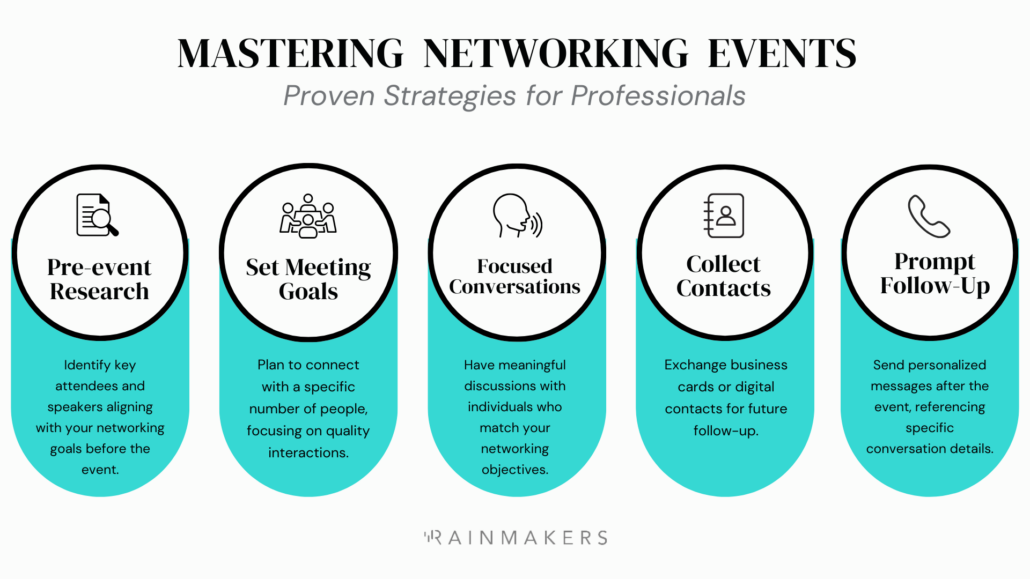Networking Strategies Every Sales Professional Should Know
Sales Networking 101
Networking is not just an accessory but a fundamental tool for success. Unlike other professions where networking might be occasional, it’s an everyday necessity for sales professionals. The ability to build and maintain a network can make the difference between meeting quotas and exceeding them.
The first step in effective networking is identifying key individuals who can be pivotal in your industry. This doesn’t mean targeting just the high-profile leaders; it involves cultivating a diverse network across various roles and industries. Leveraging platforms like LinkedIn is instrumental here. A well-maintained LinkedIn profile, strategic connection requests, and engaging content can open doors to valuable relationships.
Effective Communication Skills for Networking
Effective communication is the cornerstone of successful networking. It’s not just about what you say but how you say it. When you initiate a conversation, do so with confidence and authenticity. A warm, genuine smile and a firm handshake can set a positive tone from the start. However, effective networking communication goes much deeper.
Here are some key points to consider:
- Confident and Genuine Introductions: Begin your interactions with a self-assured and sincere greeting. A well-crafted introduction that includes your name, your role, and a brief, interesting fact about yourself can spark curiosity and open the conversation.
- Active Listening and Engaging Inquiries: Show genuine interest in your conversational partners by actively listening to what they say. Follow up with thoughtful questions that delve into their interests and professional challenges. This shows that you’re fully engaged in the conversation and helps you understand their perspective better.
- Personalized Communication Approach: Tailor your communication style to match the individual you’re speaking with. Observe their communication style – are they more formal or casual? Do they prefer detailed discussions or concise points? Mirroring their style can make the conversation more comfortable and productive.
- Expressing Empathy and Understanding: Demonstrating empathy during conversations can build deeper connections. Acknowledge their viewpoints, challenges, or achievements, and share relevant experiences of your own that resonate with their situation.
- Follow-up with Context: Follow up with a message or email referencing specific points from your discussion after your initial conversation. This personalized follow-up shows that you were attentive and value the connection, paving the way for a lasting professional relationship.

Leveraging Digital Platforms
In today’s digital age, networking extends beyond in-person interactions. Social media platforms, especially LinkedIn, are crucial for building and maintaining professional relationships.
Regularly sharing insights, commenting on industry news, and engaging in group discussions can establish you as a thought leader. Balancing online networking with in-person meetings ensures a comprehensive approach.
Cultivating Long-Term Professional Relationships
Networking isn’t a one-off task; it requires nurturing long-term relationships. Consistent communication, whether through emails, calls, or social media interactions, keeps the connection alive.
Offering help or sharing relevant information can turn a contact into a valuable ally. This interchange ensures that your network becomes a source of mutual growth and opportunities.
Events and Conferences
Networking events and conferences offer rich opportunities to broaden your professional network. The key to making the most of these events is thorough preparation and strategic follow-up. By researching who will be attending and speaking, you can pinpoint potential valuable contacts to focus on. After the event, timely follow-ups are crucial to cement the connections you’ve made.
Remember, in networking, quality trumps quantity; it’s more beneficial to have in-depth exchanges with a few key individuals than superficial interactions with many.
Below are some focused strategies:
- Before attending a networking event, take the time to research and identify key attendees and speakers who align with your networking goals. This preparation enables you to target your efforts more effectively.
- Plan for the event and set clear goals for the number of people you intend to connect with, ensuring that your focus remains on quality and meaningful interactions.
- During the event, engage in targeted conversations with individuals who match your networking objectives, making each discussion count. Don’t forget to exchange business cards or digital contacts for future follow-up.
- After the event, promptly send out personalized messages to your new contacts, referencing specific details from your conversations to reinforce the connection.

Personal Branding and Networking
Your personal brand is your signature in the professional world. Every interaction, online or offline, contributes to this brand. Storytelling about your experiences and successes can resonate more than just stating facts.
A professional image in your online presence and in-person demeanors reinforces your brand.
Networking Challenges & Measuring Success
Networking effectively requires overcoming challenges and measuring success with precision. For many, particularly introverts, initiating conversations at events can be intimidating. Adopting a learning mindset, focusing on understanding others rather than just presenting oneself, can facilitate smoother interactions. Consistently adhering to ethical standards and professionalism is crucial in all networking situations to uphold credibility.
- Overcoming Challenges: Networking can be particularly daunting for introverts who may find starting conversations challenging. To alleviate this, shift the focus from self-presentation to learning about others. This approach not only eases the pressure but also fosters more genuine connections.
- How To Track Success: Set realistic networking objectives and leverage tools like CRM software to monitor your progress and manage your contacts. This allows you to track whom you’ve met, the nature of your interactions, and potential follow-up actions. Regularly reviewing and adjusting your networking strategies based on these outcomes ensures that your efforts are organized and aligned with your professional goals.

Join Our Network
Networking is more than just a skill; it’s an art form that, when finely tuned, can significantly propel your career in sales to new heights. It demands a strategic mindset, unwavering dedication, and a genuine passion for cultivating relationships.
If you’re on the lookout for your next big opportunity in sales, don’t miss out on the chance to join Rainmakers. Sign up now to connect with a network of top-tier professionals and unlock the door to a world of exciting sales opportunities. Your next career milestone is just a connection away with Rainmakers.










